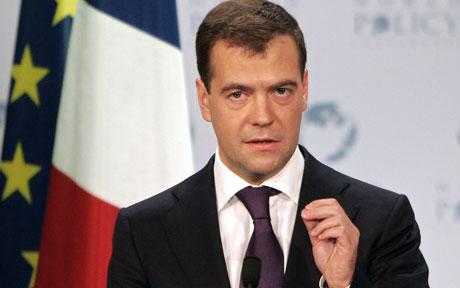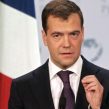
Medvedev Fingers the ‘Reset Button’ but Preaches Anti-Americanism
Publication: Eurasia Daily Monitor Volume: 6 Issue: 55
By:

Russian President Dmitry Medvedev received last Friday the Russian-American Public Dialogue Group co-chaired by Henry Kissinger and Yevgeny Primakov and confirmed that he was looking forward to the first meeting with U.S. President Barack Obama and expected "a real exchange of opinions regarding all issues" (RIA-Novosti, March 20). A fortnight before, he met with the members of the Commission on U.S. policy towards Russia co-chaired by former senators Gary Hart and Chuck Hagel and shared his feeling "that we have all the opportunities to turn a new page in Russian-American relations" (RIA-Novosti, March 10). In between these two meetings, Medvedev presided over the gathering of the Russian High Command and named NATO as a source of threat, while Defense Minister Anatoly Serdyukov elaborated on the build-up of the U.S. military presence around Russia aimed at securing access to energy resources (Nezavisimoe voennoe obozrenie, March 20).
This relapse into Putin’s Munich-style rhetoric might seem to be just a reassuring signal to the top brass that is seriously upset by the draconian cuts in the officer corps (Ezhednevny zhurnal, March 18). There is, however, such an unmistakable anti-American emphasis in the proposals, which Medvedev has prepared for the G20 summit in London, that Sergei Aleksashenko, one of the leading Russian economists, suggests that the Kremlin is fixated on a "zero-sum" financial game (Moscow echo, 19 March). There is definitely a strong desire to impose tight constraints on the U.S. leadership in the global financial system and, in particular, to undermine the role of the U.S. dollar. This ideological goal is not shared by Finance Minister Aleksei Kudrin, who agreed with his G20 counterparts to drop wishful thinking about a global currency and even instructed the reserve funds to increase their holdings of U.S. dollars (Ezhednevny zhurnal, March 19).
Kudrin, however, remains quite isolated in the crowd of courtiers stirred with all kinds of ideas about escaping from the crisis – and currently the most popular proposition has a peculiar moral twist. Medvedev has personally explained to bankers that it would not be "fair" to demand money from the insolvent Rusal and its owner Oleg Deripaska; he also maintains that the International Monetary Fund should be governed by a board with a "fair" representation of contributors. Deputy Prime Minister Igor Sechin suggested at the recent OPEC meeting to establish a more "fair" system of regulating oil prices, which the gang of seasoned quota-fixers found only slightly amusing (Kommersant, March 16). This concern about "fairness" is not always driven by pragmatic calculations but betrays a grudge about the lost prosperity and stability that were perfectly on track until the U.S. made their economic problems everybody’s headache by provoking the global crisis.
This resentment inevitably reduces thinking in the Kremlin about moving U.S. relations up from the not-that-uncomfortable nadir (Rossiiskaya gazeta, March 18). Medvedev may entertain some temptations about that already proverbial "reset button" (which on his website for some reason is called "reboot"), but it is hard to expect that he would develop a good rapport with Obama, who is everything he is not: a self-made, charismatic leader ready to take responsibility for hard decisions. Medvedev would be eager to present any compromise on the blown out of all proportion issue of U.S. missile defense in Poland as his great triumph, earned by determined opposition. He is also in favor of launching new strategic arms control negotiations, which are the only format where Russia could talk with the U.S. as "equal." New negotiated limits are so much more important since Russia’s strategic arsenal continues to shrink fast, despite all the ritual pledges to grant priority attention to new missiles and submarines. The season of demonstrating Russia’s military muscle has ended, and all the ships have returned to their home ports for extensive repairs (Nezavisimoe voennoe obozrenie, March 20).
Besides these extra-hard-security matters Russia does not seem to have any positive agenda to put on the table and it is hardly prepared to shift its ambivalent stance on Iran (Rossiiskaya gazeta, March 17). Both Medvedev and Putin tried to perform as wise statesman meeting with Kissinger, but in reality for them global issues are just a public relations campaign of little importance compared with their real priorities of re-distributing money and property among servile but disloyal oligarchs (Grani.ru, March 20). This role of two-headed godfather is central for the regime’s survival in times of falling oil revenues when doubts in the irritated elites grow and spread under the surface of total obedience. Firing governors is apparently not enough to exterminate these mutinous doubts, so the second trial of Mikhail Khodorkovsky and Platon Lebedev is rolling towards the "guilty-as-charged" sentence (Novaya gazeta, March 18).
There is no way around the simple premise that in order to achieve a new positive start in U.S. relations, Russia has to begin a meaningful reformatting of its corrupt quasi-democratic regime. The Obama administration refrains from advocating any conditions of this sort, but Medvedev seems to be aware of the need to modernize the rigid system of "Putinism." He remains reluctant, however, to deviate from the course set by his senior partner, who believes that the crisis hurts the U.S. more than Russia and will diminish its leadership, scorned as "uni-polarity." Putin relies on the "fear factor" to keep the disgruntled elites under control and expects that demonstrative generosity towards pensioners and other "have-nots" would prevent an escalation of protest activity. His new anti-crisis plan unveiled last week does not envisage any new grants to struggling oligarchs, but gives first priority to social protection; it could, however, be overtaken by the unfolding disaster – as was the previous plan adopted last November (Kommersant, March 19). Such an emergency would require different kinds of measures, and forceful mobilization against an external threat is Putin’s fall-back option of choice; anti-Americanism, therefore, remains an important political resource – perhaps the very last refuge for a pair of scoundrels.




